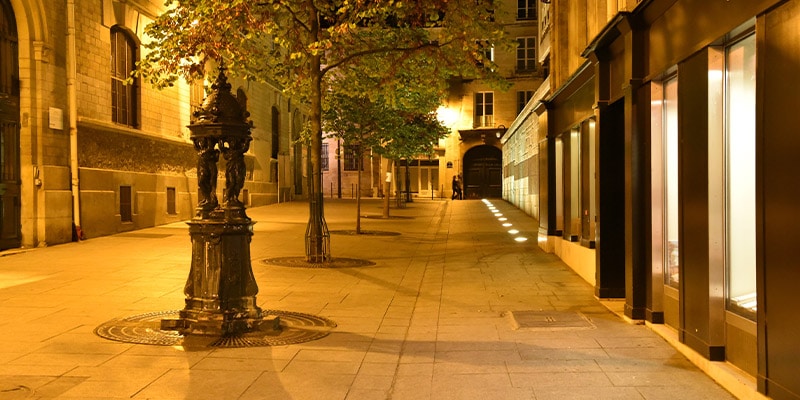The Man with the Saddest Eyes

I know that you will not remember me, but I will never forget you. Your features are etched indelibly in my mind, particularly your eyes. Not their shape or their color, but the fact that they were the saddest eyes I have ever seen.
Our encounter may have lasted five minutes, perhaps ten, no more than that. And yet it has haunted me for years. I can’t now recall the exact month, or even the year—though the season was surely spring or autumn, when we fly to Paris as faithfully as migratory birds come and go. I was at the Mémorial de la Shoah in the Marais, researching a book I was writing about Paris.
Many of the scenes in my novel take place in and around Notre Dame; but behind the cathedral’s towers that soar to the sky is a museum that sinks into the earth. And it was at the Mémorial de la Déportation that I became aware of the dark shadows underpinning the City of Light. I stood for a long time before a bronze circle set in the ground, chiseled with the words, They went to the end of the earth and they did not return.
In search of these lost lives, I found myself at the Shoah Memorial in the Marais, reading about the Nazi occupation of Paris and the roundups of the Jews. I had a stack of books before me, recommended by the librarian. But what I could not stop reading was a slim paperback I had bought in the museum shop downstairs. It was called La Grande Rafle du Vel d’Hiv.
The cover features an unremarkable street scene in Paris, a photograph taken at dawn perhaps, the street quiet and practically empty, except for a man standing on the sidewalk and another riding a bicycle down the middle of a street strangely free of traffic. A row of city buses is lined up in front of a building. Looking closer, I see that there are people on the other side of the buses, carrying small bundles, all making their way towards a large entrance into a building. And then I realize the scene is not so unremarkable after all. The banality of evil, Hannah Arendt called it, when the unthinkable and the abnormal are cloaked in normalcy: these green-and-white buses that carried people across the city on their quotidian business, were being used to transport people to the Vélodrome d’Hiver, or Vel d’Hiv. The winter stadium with its indoor track, where sports fans once came to cheer grueling bicycle races, now served a more sinister purpose, as a holding center for those eventually sent to the death camps: the end of the earth, from which they did not return.
I am so absorbed in the book, I don’t look up when you enter the library. Although there are plenty of empty tables and chairs in the room, you take a seat right across from me. That’s when I look up and see you. In your late seventies, I think, what the French call a personne agée. Old fashioned, wearing a woolen vest, a jacket, a hat. You are looking straight at me, as if wondering what I am doing there. I smile and say “Bonjour,” and you nod, gravely, courteously. You have the saddest eyes I have ever seen.
An archivist comes up and asks you if you are here to do research. You shake your head. Témoignage, you say. Testimony. You glance at the book I’m reading. “That,” you say, “I know.” As we look silently at each other, tears start to my eyes as I realize that you have lived through what I am only researching and can only imagine. You offer me a handkerchief, but I cannot stop the flow of tears. You yourself are dry-eyed, but the sadness seems etched there—no handkerchief on the earth can scrub it away.
A museum official comes to take you into another room to record your experiences. As you stand up to follow him, I say, “Monsieur, it must be so hard to relive that time, even in memory.” You nod, “Yes, it’s very hard. But it’s necessary to tell the story.” You raise your hand in farewell and then you leave.
Très dur. The words “very hard” help explain why many survivors refused to talk about those dark years—les années noires—for the rest of their lives. But some were willing to share their stories with me, to break that long silence. As that generation of survivors is slowly dying out, there is an increased sense of urgency to tell their stories and answer people’s questions, to do their part to make sure that when the world said, “Never Again,” we meant it. And we ignore what they have to tell us at our peril.
That’s what my novel ended up being haunted by, the call to memory. I think again of where my search for this thread of history began: With the bronze circle inscribed with the words: They went to the end of the earth and they did not return. And it was with a frisson of shock and recognition that I realized the French word for ghost is revenant: one who returns. That became the first line in my novel.
It has been many years since we met. Yet every time I return to Paris, I look for you, on the remote chance that our paths might cross again. You will not remember me. But I will never forget you.
I loved HAUNTING PARIS it was riveting. Like yourself I have always been intrigued by Paris, especially Notre Dame. Ive visited Shoah’s all over the world. Your book is compelling & evocative & I only pray that I have the courage of my convictions when tested to help others! Thank you for a great read!